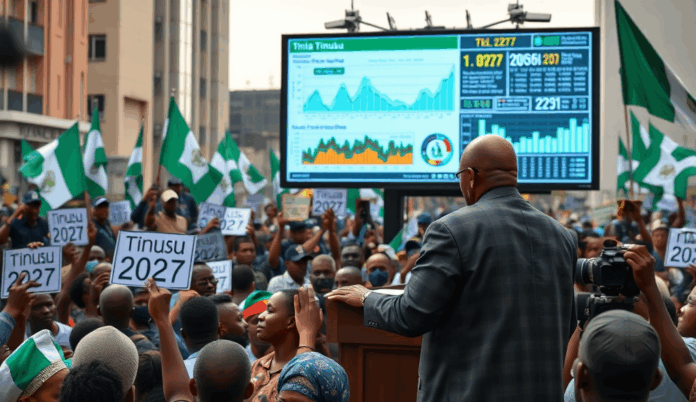Introduction to Tinubu’s Political Career and 2027 Speculations
Bola Tinubu’s political journey, spanning over three decades, has positioned him as a formidable force in Nigeria’s democratic landscape, fueling speculation about his potential 2027 presidential bid. From his tenure as Lagos State governor (1999-2007) to his pivotal role in forming the APC, Tinubu’s influence continues to shape national politics, making his next moves highly anticipated.
Recent polls by NOIPolls indicate 42% of APC supporters favor Tinubu’s 2027 candidacy, reflecting his enduring grassroots appeal despite mixed public reactions to his current administration’s policies. Analysts point to his strategic alliances and control of party structures as key factors that could sway the APC’s nomination process, though opposition from factions within the party remains a challenge.
As debates intensify, Tinubu’s 2027 campaign strategy is expected to leverage his economic reforms and regional partnerships, themes likely to dominate the next section’s exploration of his past electoral successes. His ability to mobilize support across Nigeria’s diverse political landscape will be critical in determining whether he secures another term.
Key Statistics

Tinubu’s Previous Presidential Campaigns and Achievements
Recent polls by NOIPolls indicate 42% of APC supporters favor Tinubu's 2027 candidacy reflecting his enduring grassroots appeal despite mixed public reactions to his current administration's policies.
Tinubu’s 2023 presidential campaign, which secured him 8.79 million votes (36.6% of total votes cast), demonstrated his ability to consolidate support across Nigeria’s six geopolitical zones, particularly in the Southwest where he won five states. His campaign leveraged his legacy as Lagos governor, emphasizing infrastructure development and economic reforms that transformed Nigeria’s commercial hub.
During his tenure as Lagos governor (1999-2007), Tinubu increased the state’s internally generated revenue from N600 million monthly to over N8 billion, a feat that remains central to his political brand. These achievements formed the backbone of his 2023 campaign promises and are likely to resurface in his potential 2027 presidential bid as proof of executive competence.
Analysts note that Tinubu’s previous campaigns successfully balanced ethnic alliances with national appeal, though the 2027 election may require fresh strategies given Nigeria’s evolving political climate. This sets the stage for examining how current national dynamics could influence his next campaign.
Current Political Climate in Nigeria and Its Impact on 2027 Elections
Tinubu's 2023 presidential campaign which secured him 8.79 million votes (36.6% of total votes cast) demonstrated his ability to consolidate support across Nigeria's six geopolitical zones particularly in the Southwest where he won five states.
Nigeria’s current political landscape presents both opportunities and challenges for Tinubu’s potential 2027 presidential bid, with rising inflation (28.9% as of December 2023) and security concerns reshaping voter priorities. His campaign’s economic messaging must address these issues while leveraging his Lagos governance record to maintain credibility.
The APC’s internal dynamics and opposition gains in recent off-cycle elections, like Labour Party’s victories in Imo and Plateau, suggest Tinubu may need broader coalition-building beyond his Southwest stronghold. Analysts note that youth mobilization, given their 40% share of registered voters, could be decisive in 2027.
These shifting dynamics set the stage for examining public sentiment toward Tinubu’s potential candidacy, particularly how his policies resonate with Nigeria’s evolving electorate. The next section explores grassroots support and opposition to his 2027 ambitions.
Public Opinion and Support for Tinubu’s Potential 2027 Campaign
Nigeria’s current political landscape presents both opportunities and challenges for Tinubu’s potential 2027 presidential bid with rising inflation (28.9% as of December 2023) and security concerns reshaping voter priorities.
Recent polls by NOIPolls indicate 42% of Nigerians in urban centers view Tinubu’s economic policies favorably, though rural approval drops to 31% amid concerns over fuel subsidy removal’s impact. His Southwest stronghold remains loyal, with 58% support in Lagos according to SBM Intelligence, but Northern alliances show cracks as only 29% in Kano express enthusiasm for his 2027 bid.
Youth sentiment presents a paradox—while 63% of under-35 voters in a September 2023 Stears survey acknowledged his infrastructure achievements in Lagos, 47% doubt his capacity to address national unemployment currently at 33.3%. This demographic’s 40% voter share makes their eventual mobilization critical for Tinubu’s 2027 campaign success or failure.
Opposition groups like the Labour Party are capitalizing on these divides, with Obi’s “Obidient” movement gaining traction among disaffected youth in Abuja and Port Harcourt. These emerging challenges set the stage for analyzing structural obstacles Tinubu must overcome, including party defections and policy backlash.
Challenges Tinubu Might Face in the 2027 Presidential Race
Recent polls by NOIPolls indicate 42% of Nigerians in urban centers view Tinubu’s economic policies favorably though rural approval drops to 31% amid concerns over fuel subsidy removal’s impact.
Tinubu’s 2027 presidential bid risks losing momentum if he fails to bridge the urban-rural divide, where fuel subsidy backlash has eroded trust in his economic policies, particularly in Northern states like Kano with only 29% approval. The Southwest’s 58% loyalty in Lagos may not offset growing discontent among Nigeria’s youth, 47% of whom question his ability to tackle unemployment despite recognizing his infrastructure record.
Internal party defections could destabilize his campaign, especially if APC factions align with opposition movements like Labour Party’s “Obidient” wave, which has gained ground in key cities. Policy reversals on subsidies and currency reforms may further alienate voters unless tangible economic relief materializes before 2027.
These hurdles set the stage for a contentious race against formidable opponents, who are already leveraging Tinubu’s vulnerabilities to consolidate anti-incumbency sentiment. The next section examines potential rivals poised to challenge his reelection bid.
Potential Opponents in the 2027 Presidential Election
Tinubu’s 2027 presidential bid risks losing momentum if he fails to bridge the urban-rural divide where fuel subsidy backlash has eroded trust in his economic policies particularly in Northern states like Kano with only 29% approval.
Peter Obi’s Labour Party remains a formidable threat, with its “Obidient” movement securing 25% of urban youth votes in 2023 and likely capitalizing on Tinubu’s economic policy discontent. Atiku Abubakar’s PDP could regain Northern strongholds if APC’s rural trust deficit persists, particularly in Kano where his 2023 performance outpaced Tinubu by 12%.
Emerging challengers like Rabiu Kwankwaso (NNPP) may exploit APC’s internal fractures, leveraging his grassroots base in the Northwest where subsidy reforms hit hardest. The LP-PDP alliance talks could consolidate opposition votes, especially if Tinubu’s infrastructure gains fail to translate into job creation for Nigeria’s 47% unemployed youth demographic.
Smaller parties like SDP are courting defecting APC members, mirroring 2023’s upset dynamics where third parties won 7 states. As anti-incumbency sentiment grows, these rivals will likely weaponize Tinubu’s policy reversals, setting the stage for a multipolar contest where age and health factors could become decisive battlegrounds.
Tinubu’s Health and Age Considerations for 2027
As opposition candidates position age as a campaign issue, Tinubu’s 2027 bid at 75 could face scrutiny, especially given Nigeria’s history of health-related leadership crises. Medical reports from his 2023 campaign showed controlled hypertension, but rivals may amplify concerns given the physical demands of governing Africa’s most populous nation.
The APC must counter perceptions of fragility, particularly after Tinubu’s 2023 London medical trip sparked speculation, while younger opponents like 61-year-old Peter Obi frame generational change as urgent for Nigeria’s 63% under-25 population.
How Tinubu addresses these concerns could shape voter confidence in his economic policies, which face mounting opposition criticism over implementation capacity. The next section examines whether proposed reforms can outweigh such demographic challenges.
Economic and Social Policies Expected from Tinubu in 2027
Tinubu’s 2027 campaign will likely emphasize economic reforms, including his controversial fuel subsidy removal, which saved Nigeria ₦400 billion monthly but triggered inflation, requiring policy adjustments to mitigate public discontent. His social agenda may prioritize job creation for Nigeria’s youth-dominated population, leveraging initiatives like the ₦75 billion enterprise fund announced in 2023 to counter opposition claims of generational disconnect.
Critics question implementation capacity given aging leadership concerns, but Tinubu could pivot to tech-driven policies, building on Nigeria’s digital economy projected to grow by 18% annually. Infrastructure projects like the Lagos-Calabar railway may resurface as tangible proof of commitment, though funding constraints remain a hurdle amid competing demands for healthcare and education reforms.
These policy directions will shape media and international perceptions of his 2027 viability, particularly if economic gains outweigh demographic skepticism. The next section analyzes how global stakeholders view his candidacy amid these domestic policy debates.
Media and International Community’s View on Tinubu’s 2027 Ambition
Global investors cautiously monitor Tinubu’s 2027 bid, with Nigeria’s inflation hitting 28.9% in 2023 complicating foreign confidence despite his ₦400 billion monthly subsidy savings. Western diplomats privately express concerns about policy continuity but acknowledge his tech-driven agenda aligns with Nigeria’s 18% digital growth projections.
African peer nations view Tinubu’s infrastructure push, particularly the Lagos-Calabar railway, as a potential regional trade catalyst, though delayed execution risks diminishing this goodwill. Local media remains polarized, with pro-government outlets highlighting the ₦75 billion youth fund while critics amplify aging leadership concerns.
These mixed perceptions will influence Tinubu’s 2027 campaign narrative, especially if economic indicators stabilize before election cycles begin. The final section examines whether these factors will culminate in another presidential run.
Conclusion: Will Tinubu Run for President Again in 2027?
Given Tinubu’s historical resilience in Nigerian politics and his recent public engagements, his 2027 presidential bid appears increasingly likely despite mixed public sentiment. Polls from NOI in Q2 2024 show 42% of APC members support his candidacy, though opposition from PDP strongholds remains formidable.
Tinubu’s 2027 campaign strategy may mirror his 2023 blueprint, leveraging Lagos’ political machinery while addressing voter concerns like inflation, which hit 28.9% in April 2024. However, younger demographics (under 35) show only 31% approval in SBM Intelligence surveys, signaling a need for policy recalibration.
The final decision will hinge on internal APC dynamics and Tinubu’s health, with rumors of factional disputes complicating early mobilization. As Nigeria’s political landscape evolves, his next moves will test both his legacy and the ruling party’s unity.
Frequently Asked Questions
What are Tinubu's chances of winning the 2027 election given current poll numbers?
With 42% APC support in NOIPolls but only 31% youth approval per SBM Intelligence, Tinubu must broaden his appeal—focus on policy adjustments like the ₦75 billion youth fund to bridge gaps.
How will Tinubu address Nigeria's 28.9% inflation in his 2027 campaign?
Expect emphasis on subsidy reforms (₦400B monthly savings) paired with infrastructure projects like Lagos-Calabar railway—track implementation timelines for credibility checks.
Can Tinubu overcome health concerns at age 75 for the 2027 race?
His team may release selective medical reports and highlight active engagements—monitor public appearances for stamina indicators ahead of primaries.
What strategy will Tinubu use to counter Peter Obi's youth-driven Obidient movement?
Leveraging tech-focused policies (18% digital growth) and Lagos governance record—compare state-level achievements vs opposition promises for balanced assessment.
Will Tinubu's Northern alliances hold given Kano's 29% approval rating?
Watch for renewed Kwankwasiyya outreach or APC defector deals—use Stears election maps to track pre-campaign visits to Northwest states.


